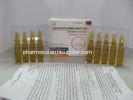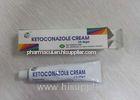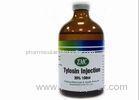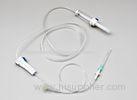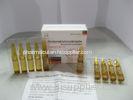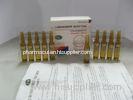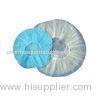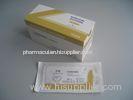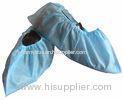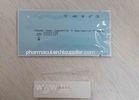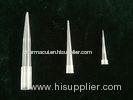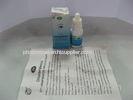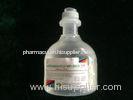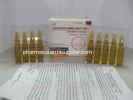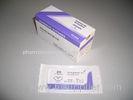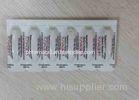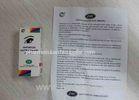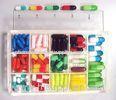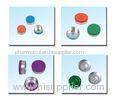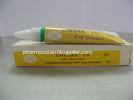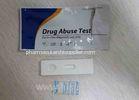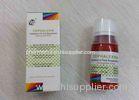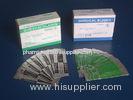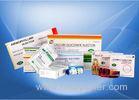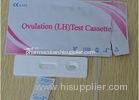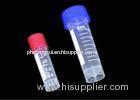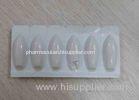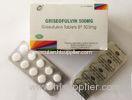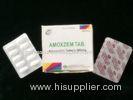|
ZHEJIANG MEDICINES&HEALTH PRODUCTS I/E CO.,LTD
|
80MG / 2ML Antibiotics Gentamicin Injection For Urinary Tract Infections / Pneumonia
| Place of Origin: | Guangdong, China (Mainland) |
|
|
|
| Add to My Favorites | |
| HiSupplier Escrow |
Product Detail
Gentamicin Injection Medicines 80MG / 2ML Antibiotics 2*5Ampoules / box
<span style="font-family:ti
Gentamicin Injection Medicines 80MG / 2ML Antibiotics 2*5Ampoules / box
GENTAMICIN SULPHATE 80MG/2ml INJECTION
COMPOSITION:
Each 2 mL ampoule contains gentamicin sulphate equivalent to gentamicin base 80 mg/2 mL.
PHARMACOLOGICAL ACTION:
Gentamicin is an aminoglycoside antibiotic with in vitro bactericidal activity against Gram-negative organisms including strains of, Escherichia coli, Enterobacter, Klebsiella, Proteus and Pseudomonas species. In vitro sensitivity does not necessarily imply in vivo efficacy. With the exception of Staphylococcus aureus gentamicin sulphate is not active against gram-positive organisms. In the treatment of Staphylococcal infections gentamicin must be used in combination with other antibiotics. Gentamicin is absorbed rapidly when administered intramuscularly. It is excreted almost entirely by globular filtration.
INDICATIONS:
Gentamicin injection is indicated for the following conditions, when caused by susceptible organisms;
| 1. | Urinary tract infections; (Not indicated for the treatment of uncomplicated urinary tract infections). |
| 2. | Systemic infections, e.g. Septicaemia, peritonitis; |
| 3. | Bone and soft-tissue infections, e.g. osteomyelitis, wound and soft-tissue infections; |
| 4. | Infected burns; |
| 5. | Infections of the respiratory tract e.g. Pneumonia. |
CONTRA-INDICATIONS:
Gentamicin is contra-indicated in patients with a known history of allergy to it. Aminoglycosides should be avoided in patients with myasthenia gravis.
Pregnancy and lactation.
WARNINGS:
Due to the risk of ototoxicity and neurotoxicity with prolonged use of aminoglycosides, gentamicin must be restricted to the therapy of life-threatening infections in which a less toxic antimicrobial agent is not suitable. Serum peak levels of 10 micrograms/mL must be avoided as this could be toxic. Serum trough levels of more than 2 micrograms /mL may be the best indication of accumulation of gentamicin which may be associated with toxicity.
To ensure safe and effective therapy, dosages should be monitored with serum peak and trough levels. Where practical, regular determination of plasma creatinine levels is advised.
Toxic levels may be reached when gentamicin is administered in normal doses to patients with impaired renal function.
DOSAGE AND DIRECTIONS FOR USE:
Intramuscular Administration:
Gentamicin Injection is usually administered intramuscularly. Intravenous administration should only be reserved for special cases. (Refer Intravenous Administration).
Adult patients with normal renal function:
3 mg to 5 mg/kg/day in 3 equal doses (8 hourly).
Children, infants and neonates:
Children:
A dose of 3 to 5 mg/kg/day is administered in three equally divided doses every 8 hours, depending on severity.
Neonates and infants less than 1 week:
6 mg/kg/day is administered in two divided doses every 12 hours.
Infants older than one week:
6 mg/kg/day administered in two equal doses every 12 hours, or three equally divided doses every 8 hours.
Intravenous Administration:
This route of administration is only recommended in special circumstances. Doses for administration are the same as those used intramuscularly. Intravenous administration may be infused over a period up to 2 hours. Dilutions of up to 160 mg per litre of Sodium Chloride 0.9% and or Dextrose 5% are compatible and may be used, within 24 hours of admixture.
Duration of Treatment:
The course of treatment should be limited to 7 to 10 days.
SIDE-EFFECTS AND SPECIAL PRECAUTIONS:
It can produce irreversible, cumulative ototoxicity affecting both the cochlea (manifest as hearing loss of higher tones) and more common, the vestibular system (manifest as dizziness and vertigo). Concurrent use of an anti-emetic eg. dimenhydrinate may mask the early symptoms of vestibular ototoxicity.
Reversible nephrotoxicity may occur and acute renal failure has been reported, often in association with the concurrent administration of other nephrotoxic agents eg. other aminoglycosides, vancomycin, some cephalosporins, or potentially ototoxic agents such as ethacrynic acid and furosemide.
Renal impairment is usually mild, although acute tubular necrosis and interstitial nephritis have occurred. Decreased glomerular filtration rate is usually seen only after several days, and may even occur after therapy has been discontinued.
STORAGE INSTRUCTIONS:
Store below 25°C. Keep out of reach of children.

